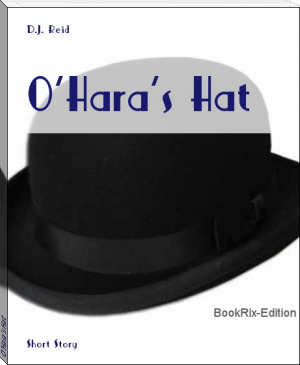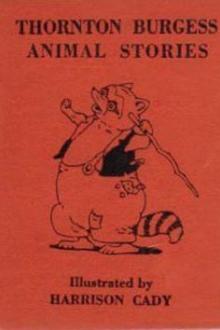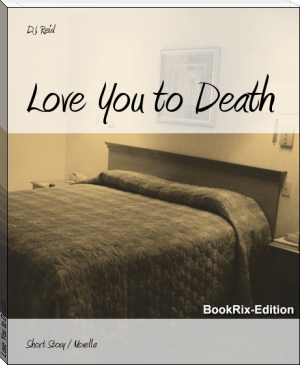O'Hara's Hat - D.J. Reid (classic books for 13 year olds TXT) 📗

- Author: D.J. Reid
Book online «O'Hara's Hat - D.J. Reid (classic books for 13 year olds TXT) 📗». Author D.J. Reid
Emily Thornton did not think of herself as a fussy woman, but she was. When she arrived at the park bench on which she was accustomed to sit most afternoons when the weather was fine, she was disconcerted to find a hat in the very spot where she always, always sat. For just a moment (and no longer, for she was a keenly self-possessed individual) she was stunned into inaction, looking first at the hat and then in either direction along the path. But there was no one in sight, and the hat remained fixed to the spot — “her” spot — as if it had always been there and had a right to be there, which, of course, it did not.
Thus, after a few moment’s further scrutiny, Emily sat down, taking an unaccustomed position on the bench next to the hat but far enough away to indicate to anyone who passed by that the hat, regardless that it was a man’s hat in any case, clearly did not belong to her. It was as though the hat had its place and she had hers, or at least a place that she was prepared to occupy temporarily now that the hat had displaced her.
On the whole, Emily might have thought, if she had not been put out by the hat’s being there in the first place, that the hat was rather handsome. No doubt it had been forgotten by a fashionable gentleman, a man of a certain age, because of course such hats are not worn by the young. Emily was aware of this because she, too, was of a certain age and wore, not merely because the weather had turned rather brisk but also out of a sense of fashion, a hat and matching gloves.
Someone was sure to miss this errant hat, and the sooner the better.
Emily was mulling over this point when there hove into view around a bend in the path a stout, bespectacled man with ruddy cheeks and a shock of white hair that stood up from his forehead like a dollop of whipped cream. As he strode by, well shod in polished black brogues, his double-breasted gray topcoat well buttoned up, Emily thought, here’s exactly the sort of gentleman who would wear a fine, old-fashioned hat. And so she raised her voice and called after him, “Excuse me. Sir, excuse me.”
The old fellow stopped abruptly, turned in a befuddled sort of way, and finally brought his friendly green eyes to rest on Emily. “Were you speaking to me?” he rumbled, and then he cleared his throat and repeated the question, for he was a tenor, not a gravelly baritone.
“Yes, I’m sorry to trouble you. Do you mind?” Emily gestured him to her with a crook’d, nicely gloved finger.
“No, of course not.” Here’s a genial fellow, thought Emily, as he strode over to stand before her, bowing slightly in her direction. “Is there some problem?”
“I’m not sure it’s a problem exactly. No, I wouldn’t call it a problem.”
“How can I help?” He asked patiently.
“It’s about a hat,” Emily said, beginning now to gather her wits.
“A hat?”
“This hat.” She turned her gloved finger to the object in question.
“This hat?”
“Yes.”
The gentleman chuckled heartily. “Well, sure, and a handsome hat it is, too.”
Emily was audacious. She always prided herself on being audacious. “Is it yours?”
“Mine?” The man grinned. “What makes you ask that?”
“It’s just that it’s quite cold, and you’re very well dressed.”
“Thank you. That’s kind of you to say.”
“But,” said Emily, “you don’t have a hat on, do you?”
The man ran his hand over the wisp of white that stood up from his noggin. “Now that you mention it, no. I don’t, do I?”
Emily nodded. “I wonder if this is your hat.” She was almost certain that it was his hat.
“I don’t see how it could be mine.”
Emily explained, “It was just here when I sat down. In fact, it’s in my place. I usually sit there.” She pointed to the place occupied by the hat. “But the hat is there.”
“I can see that. Yes.”
Emily was on the verge of losing patience. “You don’t think it’s yours?”
The gentleman considered. “It’s a nice looking hat,” he said at last.
“It would go very well with your coat,” said Emily.
“Do you think so?” The man considered the color of his sleeve, holding it close to the hat. Then he straightened up again. “But I can’t think that it’s my hat.”
Still unconvinced, Emily continued, “Are you sure? I dare say it would suit you. I have an eye for these things.”
“Perhaps you should take it home to your husband,” suggested the bluff fellow, which made the color rise in Emily’s cheeks.
“Oh, no. I couldn’t do that,” she said quickly.
“I’m sure whoever left the hat would want it to have a good home.”
“But I don’t have a husband,” said Emily. “Well, that is to say, I don’t have a husband any longer.”
“I’m sorry to hear that.”
“He was right to leave. I wasn’t a very good wife.” Emily sighed as if seeing a wormhole in an otherwise perfect apple.
“You seem very, er, conscientious to me,” the man stammered. “That’s a fine quality.”
“Do you think so? How kind of you to notice.” Emily felt as though this conversational path would not do and so put it back on course by saying, “Are you sure this hat doesn’t belong to you?”
“Well, I’m pretty sure. Have you examined it?”
Emily looked aghast. “Oh, my, no. I haven’t touched it. Don’t you think that would be presumptuous?”
The man chuckled again. “I’m sure the owner wouldn’t mind. Perhaps his name is in it.”
“Could you...?” She gestured with a gloved hand.
“What? Oh, you mean look at it. Well, yes, I suppose I could do that.” He picked up the hat and held it at arm’s length, giving it a thorough looking over. “It has a fine shape,” he concluded.
Emily sighed audibly. “That’s what I thought. It’s a fine hat. A bowler, isn’t that what they call the style?”
“Yes. Or a derby. I’ve heard them called that, too.”
“A gentleman’s hat.” Emily spoke almost to herself, as if confirming everything she thought about the hat and its unknown owner.
“Rather old-fashioned.” commented the man.
“Yes, I suppose I am,” said Emily in an abstract way.
“No,” the fellow guffawed. “I was referring to the hat. It’s rather old-fashioned. You don’t see them worn much nowadays.”
Emily took a serious tone. “I don’t think a true gentleman’s hat ever goes out of style, do you?”
The man smiled now. “My thoughts exactly. How perceptive you are.”
“You are kind. Won’t you sit down?”
“But then I would be in your place. That would hardly do.”
“Oh, you are quite right.” With this, Emily stood up and moved over to her accustomed place on the bench. “Yes, there. That’s much better. I don’t know why, I always like this side of the bench.”
“Everyone has a preference.”
“You must think me very odd.”
“Certainly not. You are conscientious and perceptive. Those are fine qualities.”
Emily was warmed by his words. “Will you sit down now?”
“How nice of you to ask.” He sat, gathering the skirts of his long topcoat around his finely trousered legs, and placed the hat on his lap.
“My name is Emily.” She held out her gloved hand which, having slipped off his own glove, he took hold of.
“I’m Red.”
“Oh, I don’t think so.”
He laughed. “No, that’s my name. Red. When I was younger, I had red hair. It’s all gone white now, as you can see.”
Emily echoed his laughter. “Yes, I do see. But you still have the nickname.”
“Yes, nicknames are for life, don’t you think?”
“I suppose they are. I never had one,” she said. “I’ve always been just Emily Howard. Well, not truly always. Just after I married Mr. Howard. He left me, oh, I suppose it must be ten years ago now.” She paused, trying to call up her lost husband’s face and failing. “Just left,” she continued. “Said I was boring and predictable. I am, of course. He was absolutely right. Mr. Howard was always right. But there, I’m prattling on.” She stopped abruptly.
“He was a fool to leave you,” said Red quietly.
“Why, thank you, er, Red.”
“It’s John actually. John O’Hara. But feel free to call me Red, just as if I still had red hair.”
“Are you married, Red?” Emily said, not in any way to seem forward but simply because it was a natural question to ask, given her own revelations about her married life.
Red cast his eyes downward, thinking. “No,” he said at last. “I don’t think so. No, definitely not now.”
“Perhaps you were once married,” suggested Emily.
“That’s possible,” Red conceded. “To be honest, I don’t remember. Funny, isn’t it? Memory, that is.”
“Memory can be tricky thing.” agreed Emily.
“Yes. Like this hat.” He held up the bowler.
“How’s that?”
“Well, someone has forgotten this hat. I wonder when he’ll remember it. Or if.”
“Maybe,” said Emily, “he’ll never remember it at all. It will be as if the hat never existed — in his life.”
“But it does exist in ours now, doesn’t it?”
“I wonder how long we’ll remember this hat.”
Red turned to look into Emily’s eyes. “You have quite a philosophical nature... Emily. Or should I call you Mrs. Howard?”
“Oh, no, I much prefer Emily. Mrs. Howard sounds so formal. Emily sounds as though we’re old friends.” She returned his gaze steadily, boldly, as she told herself at that moment.
“Yes, it does, doesn’t it?”
At this delicate moment a scruffy teenager rolled around the bend in the path on a skateboard, which he brought to a grinding stop in front of the bench. It vaguely crossed Emily’s mind to wonder what ill-gotten goods he had stuffed into the bulging pockets of the Army-surplus fatigue jacket he wore. His jeans were frayed at the cuff above sneakers that had seen better days. In one hand he was carrying a plastic take-away cup, which he shook to indicate that it contained a few coins. He tipped up the skateboard with the toe of one sneakered foot and thrust the cup forward with a shake. “Spare change?”
Emily turned to Red. “Maybe he knows.”
“Knows what?” asked the kid suspiciously.
Red looked puzzled, and so Emily prompted, “The hat.”
“Yes, of course. The hat.” He held up the bowler. “This hat.”
Emily addressed the teenager. “Is this hat yours, young man?”
The scruffy boy’s mouth opened with a loud “ha.” “Honestly, lady, do I look like I’d wear that hat?”
Red responded, “It might look good on you.”
“It’s very stylish,” added Emily.
The boy shook his head. “Well, it’s not my style. Any spare change?” He rattled the cup.
“He could be right,” said Red.
“Maybe he knows whose hat it is.” Emily turned to the boy, “Do you come by





Comments (0)